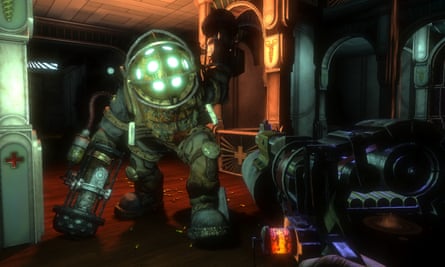
I can kill foxes but I can’t kill wolves. Not in real life, obviously – in real life I send emails eight hours a day – but in The Legend of Zelda: Tears of the Kingdom, where every animal is an arrow away from becoming a fortifying meal. Shoot a wolf and you’ll be rewarded with a thick red slab of raw prime meat, but I can’t do it, I just can’t do it, even though they often attack me in packs. They look too much like dogs.
I can kill a fox – even though they never attack me, and they often let out sad little yelps – but many other gamers can’t. One post in the Tears of the Kingdom subreddit is entitled, “I can’t shoot the foxes” and has almost 500 upvotes. “They’re so sweet and nice I can’t bring myself to hurt them,” the original poster wrote.
None of this, naturally, makes a lick of sense. Foxes, wolves, whatever – every animal in Tears of the Kingdom is made entirely of code. Morally and materially, there is no difference between shooting a wolf and clubbing an enemy to death with a boulder attached to a stick (in the game, I repeat, in the game). Yet somehow, many of us find one of these actions emotionally easier than the other. Why exactly is this, and what other ethical limitations do gamers set for themselves?

Twenty years ago, a software engineer who we shall call Tom (he asked not to be identified) decided to return the Nintendo strategy game Pikmin to where he bought it. The game’s eponymous creatures are tiny half-plant, half-animals who make suitably adorable squeaks; as the protagonist, you round them up and use them in combat. Though it is entirely possible to complete the game without sacrificing a single Pikmin, the mites are clearly intended to be expendable – something that troubled Tom. “It was very frustrating and saddening,” he says.
Tom, who is now 42 years old and lives in Alabama, felt sorrow and disgust when he reached the game’s first boss and realised he would have to sacrifice his newfound friends. So he conscientiously objected and returned the game. Despite this, he can play games where he needs to kill people in self-defence, or where the actions of the protagonist are explicitly presented as immoral.
“Pikmin definitely crossed a line for me that other games didn’t,” he says “This was not just killing in defence … It was throwing away the lives of those I’d recruited for my own purpose.”
Is all of this as simple as not wanting to “kill” things that are cute or harmless? Some people don’t shoot the horses in Red Dead Redemption and animal rights organisation Peta once condemned catching bugs in Animal Crossing. Yet our gaming ethics are often highly personal.
“When playing PowerWash Simulator I refused to spend any of the in-game currency I earned on buying the various upgrades,” says Will Cooling, a 37-year-old diversity manager from the West Midlands. As a boy, Cooling used to help hose down the fridges and workstations at his dad’s butchers – the game reminded him of this, so Cooling sought to play authentically. “It wasn’t like my dad would let me buy new tools if I encountered a bad stain!” he says.
Cooling’s refusal to invest in upgrades meant each level took much longer to complete than necessary, but eventually the game forced him to forgo his principles to continue playing. “That broke my immersion,” he says, disappointed that the game refused to reward what he calls, “the digital equivalent of elbow grease”.

Abby Marks, a 21-year-old student from Florida, has to pick up litter when she plays survival game The Long Dark. “I spent a lot of time as a kid running around in the woods and seeing the trash that got left all around really bothered me, and I always felt some responsibility to clean it up,” she says. This transferred over into playing the game.
Nonetheless, Cooling and Marks can happily play violent games. At the same time that Cooling was playing PowerWash Simulator last summer, he was also enjoying first-person shooter Prodeus. “If I’m playing a more violent game, then that’s the persona I’m playing, and I play to the blood-curdling logic of that game,” he says. He also finds that violent games, “don’t give you as much time to brood on things like morality or purpose because the action is so frenetic”.
Still, explicitly violent games can cross the line for some gamers. Seth Katz, a 42-year-old hospital vice-president in Kansas, finds himself unable to harvest the “little sister” characters in the underwater adventure, BioShock, even though doing so would help him upgrade faster in the game.
“It just seems wrong,” he says, “It’s not something that happens off screen, but you have to watch your character do it and there are maybe a dozen of these characters in the game so you have to do it over and over and over again.” He is able to “murder” freely in other games, such as Call of Duty and Borderlands, because the enemies are “mindless” and “faceless” and his actions are justified as self-defence.

Some games are designed to present gamers with ethical dilemmas – harvesting the little sisters in BioShock results in a “bad” ending, while Red Dead Redemption features morality meters that measure a player’s decisions. Yet many gamers feel ethically conflicted in games that don’t invite this scrutiny.
Sarah Taylor, a 34-year-old PR director from Berkshire, played The Legend of Zelda: Breath of the Wild as a vegan in lockdown. “I decided not to kill any animals or eat any animal products in-game,” says Taylor, who went vegan in 2019 after trying out Veganuary. Although she says being vegan in the game started as a joke, she began to take pride in her actions (the secret to not eating virtual meat, she says, is stocking up on radishes and durians). “I was proud that my values carried over to the game. Even though I knew it would make no difference!”
Charlotte, a 33-year-old film festival worker from Glasgow, has more specific Zelda rules. While she does eat meat in the game, she doesn’t kill foxes, crows, small birds or goats. She also avoids killing enemies when they’re wearing little backpacks full of fruit. “It feels like they’re kind of busy doing their gathering and not doing any harm. They have to survive in the world like I do,” she argues. “I also don’t attack them when they’re asleep or chatting with their friends round the campfire. There’s something kind of touching the way the interspecies bad guys all hang out together and have their own communities.”
Academics have studied our moral choices in video games. In 2012, Baylor University, Texas, media lecturer Daniel Shafer found that players can either be “morally activated” or “morally disengaged” while gaming – the latter being likely to choose “evil” options when playing. The most common justification from this group was that, “it’s just a game”, while morally activated people had empathy for their in-game “victims”.

Another study, published in 2010 by academics from Vrije Universiteit Amsterdam, found that gamers felt guiltier if they engaged in virtual violence that was “unjustified” in the story. Additionally, researchers wrote, “people felt guiltier when they shot video game characters whose private social background was known than when the character’s background was unknown”.
Whether any of this affects our real world actions is a debate that’s been going on for decades. Some academics believe that harming animals in video games can contribute to moral indifference toward animals and to their routine mistreatment, while other experts have found that video games don’t lead to violent behaviour.
The crossover between the real and the virtual is undoubtedly complex. Though many gamers bring their real world morals into games, things clearly vary from game to game and scenario to scenario. I can’t kill a wolf in Zelda, but I will happily remove the ladder from a Sim’s swimming pool and watch them drown. I can confidently say that I’m unlikely to perform either of these actions in the real world – although, thanks to Zelda, I am sometimes tempted to go into my neighbours’ houses and smash up all their pots.

